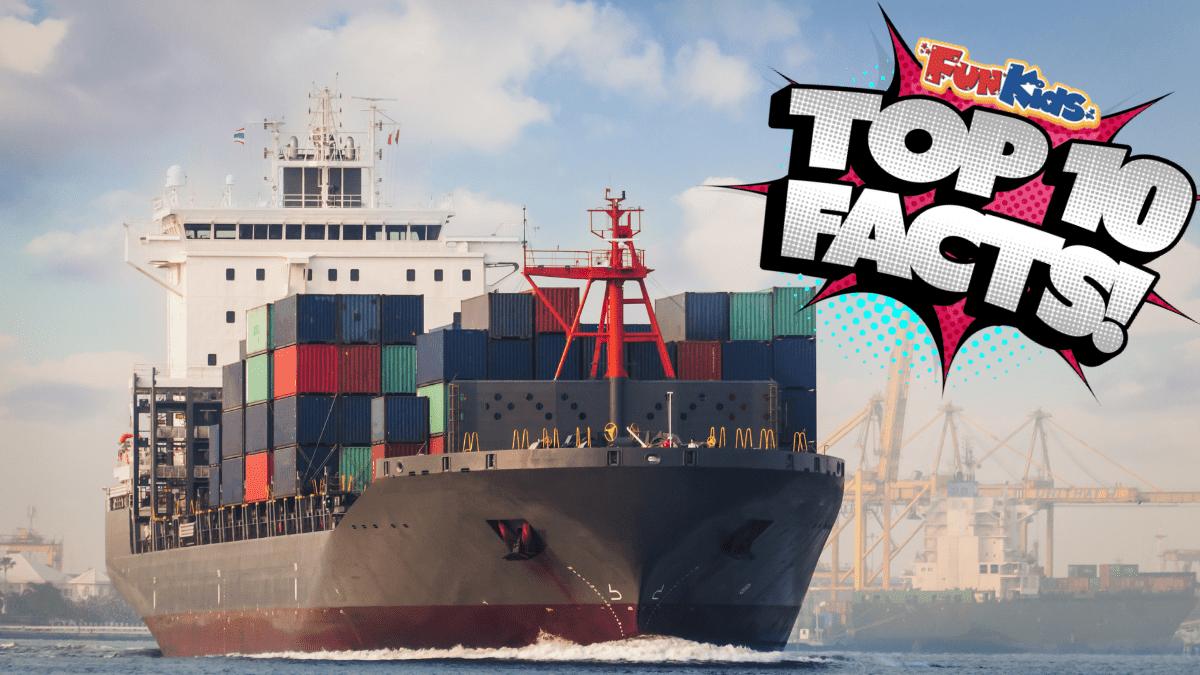Ships have been around for thousands of years and have been a major part of human history. They have been used for travel, trade, exploration, and war. They have also been the subject of many stories, legends, and myths. We’re exploring Top 10 Facts about ships that are sure to surprise you. From the incredible container ships to the amazing age of some of the oldest vessels, these facts will give you a greater appreciation for the incredible technology and engineering of ships.
In fact we have a brand new series of Sean’s Ships exploring world trade and looking at ships of the past, present and future.
1. The first ships were rafts!

The first ships would have been basic rafts and canoes. That was until a very important invention… the sail, which lets wind power do all the work, rather than human muscle alone. Ships could travel further and for longer – allowing people to explore greater distances than ever before. Over time, ships got more and more specialised, with different types for fishing, transporting products and also carrying people.
2. Ships have been used for thousands of years.
The oldest ever found is the Pesse Canoe which is believed to be 10,000 years old.
3. The UK is an island nation and 90% of everything bought arrives by sea.

The largest imports into the UK are crude oil and gas from places like Norway, USA and Middle East, clothing and computers from China, cars from Germany and fruit, like oranges and lemons from Spain. The UK exports many goods to other countries including cars and vaccines.
4. Some of the first traders that used ships were Ancient Egyptians.
Around the year 2,000 BC, people first settled here along the River Nile where the soil was nice and healthy. They could grow grain and crops to survive, and make their own clothes. But soon they wanted more than they could make locally. So they built wooden boats and sailed along the Nile into the Mediterranean to sell spices, gold and other goods, and buy goods like wood from Lebanon.
5. Greeks and Romans used boats to explore the world.
The Greeks and Romans were big traders, taking goods from place to place across their Empires. By the 1400s, most European countries were exploring the world by sea to find new trade routes to Asia for tea and spices, and Africa for gold, ivory and beads. Soon they were crossing the Atlantic Ocean to North and South America, although that did lead to the development of the slave trade. By the 1700s many European nations, particularly Britain, Portugal, Spain and Holland had set up colonies around the world.
6. The very largest container ships can carry over 23,000 containers.

A container ship can carry thousands of containers, all with different things inside them. The very largest can carry over 23,000 containers. Now, if that was a train it would be 44 miles long!
Find out more about ships here!
7. Boats in the future may be able to sail themselves.
Technology is improving so that soon there will be ships that can propel themselves. They’ll use sensors and GPS to tell where they are in the world. They wouldn’t have to be at sea – they could be used on canals and rivers to transport things between towns and cities.
8. The biggest ship in the world was taller than the Eiffel Tower.
Embed from Getty ImagesThe Seawise Giant was the longest ship ever constructed, at 458 metres – that’s longer than the height of many of the world’s tallest buildings, including the Eiffel Tower which is 330 metres tall.
9. Ships normally last 25 years.

Ships have a life expectancy. Most ocean-going cargo ships can last between 20 and 30 years while a sailboat which is made of plywood or fiberglass lasts longer – between 30 and 40 years.
10. The word ‘quarantine’ comes from when ships were quarantined during plague times.
The word quarantine comes from Italian quaranta giorni or forty days. It comes from the Venetian policy of quarantining ships from plague-stricken places for 40 days, ensuring no one infected is on board.
From the 17th century onwards, the term was extended to “any period of forced isolation”.
Watch the video below to find out how ships float!
Send us your favourite facts!
Is there something we've missed? Got a fact you're dying to tell us? Submit it below and we could use it on a future Top 10 Facts page!
Remember to always ask an adult before filling out forms online.
Top 10 Facts
From the Tudors to rocks to fish, we have all the best facts right here!
More From Top 10 Facts



